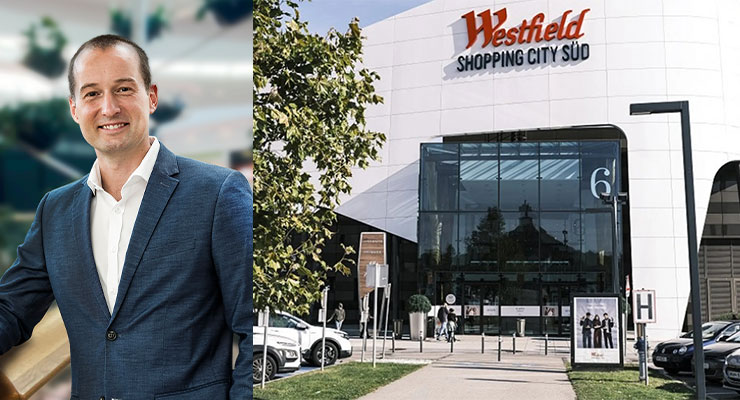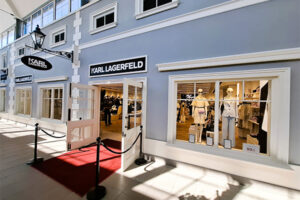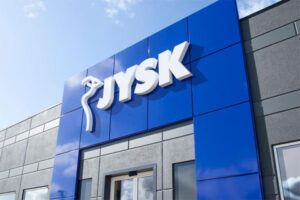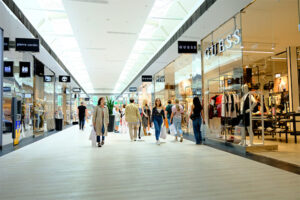ACROSS: Let’s start by taking a look back at 2008, when Unibail-Rodamco bought Shopping City Süd. What was the selling point back then, and is it still the USP today?
Zsolt Juhasz: The Austrian entrepreneur Hans Dujsik built a visionary shopping center in 1976. He set new standards and built the center in a way that we still benefit from today, which is unique in the industry. For example, SCS is built in a way in which customers can enter the center from every side at the ground level. They park their cars and are just a few steps away from the shopping level. The good starting point, the large catchment area comprising 3.3 million people within a one-hour radius, as well as the generally promising location, which is situated at one of the most important traffic junctions in Central Europe – with 150,000 cars passing through every day, and the associated development opportunities were decisive arguments for Unibail-Rodamco to purchase the center in 2008.
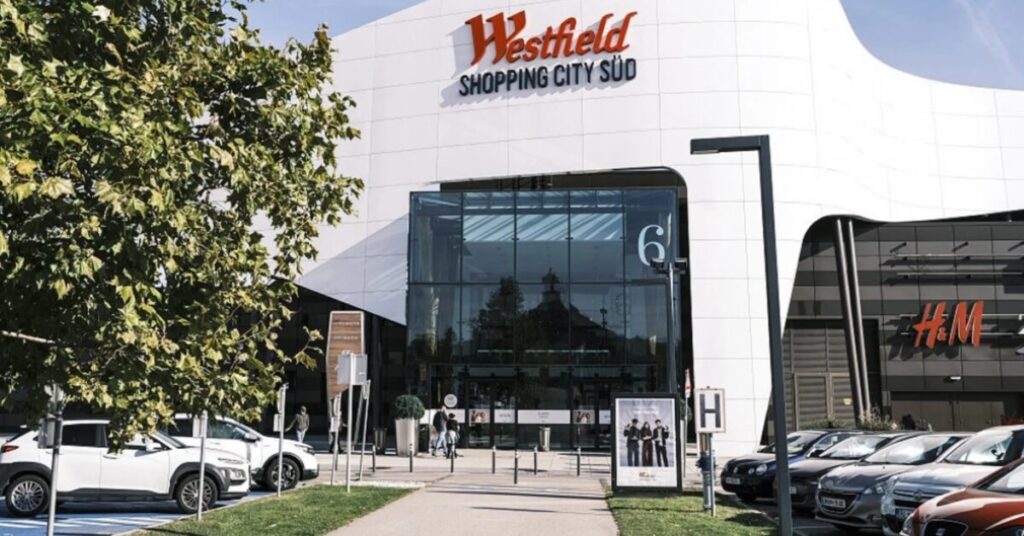
SCS at a Glance
Location: Vösendorf, Lower Austria, on the border of Austria’s capital, Vienna
Catchment Area: 3.5 million people
Leased Area: 225,800 sq m
Number of Shops: 330
Parking Spaces: 10,000
E-charging Stations: currently 11, but an expansion to 100 is planned for 2025
Visitors per Year: 20.4 million
Average Dwell Time: 142 minutes on average / prior to the pandemic in 2019: 140 minutes
ACROSS: That was followed by an extensive refurbishment in 2011, in which an investment of 100 million euros was made, and finally, the rebranding to Westfield Shopping City Süd in 2021. What has been your focus since then?
Juhasz: We are focused on further developing and constantly adjusting the tenant mix. We have also wholly reorganized the entire gastronomy and entertainment area. The third major topic that resonates with every step we take is sustainability. As part of our Group-wide sustainability initiative, Better Places 2030, we have implemented concrete environmental and climate protection initiatives for several years. However, we want to go further as an individual location. Our declared goal is to become Austria’s climate champion by 2032, and we are on the path to achieving that.
ACROSS: What are some specific examples?
Juhasz: One current example is the roofing of one of our parking decks with photovoltaic systems. 1,300 PV modules will generate almost 450,000 kilowatt-hours (kWh) per year and complement the large-scale system that was installed on the main roof in 2021, resulting in a capacity of 4.3 MWp. That will give existing areas a dual use, which directly contributes to our sustainability goals. Another example comes from the event sector. We organize the Westfield Good Festival every year. Sustainability is exemplified at the event. We organize panel discussions, offer workshops where visitors learn how to recycle, and provide information about local sustainability projects. All of that is done to show how easy and fun sustainability can be. We are honest: Building a shopping center is the opposite of being sustainable, but operating one can be very sustainable, and SCS is the best example of that. However, sustainability events are not customer magnets, which is also part of the reality, but we will keep organizing such events and will strengthen our commitment.
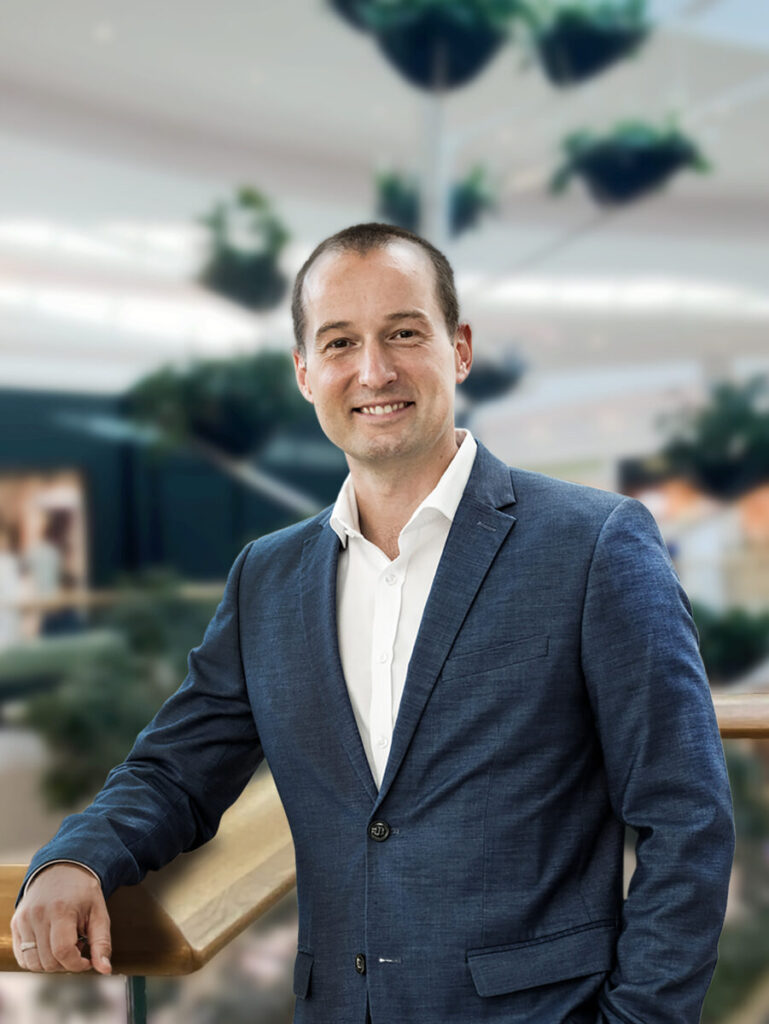
Zsolt Juhasz
Zsolt Juhasz began his career in the tourism and hotel industry. He gained international hospitality experience in London, Glasgow, and Vienna. Before joining Unibail-Rodamco-Westfield, he was the managing director of a Hamburg-based hotel group, responsible for the development, acquisition, and operational management of hotels in Vienna and Budapest. Before taking over the management of Westfield Shopping City Süd, he was the Center Manager at Westfield Donau Zentrum in Vienna.
ACROSS: That illustrates the fact that even though consumers demand sustainability, it has not yet become a part of everyday life.
Juhasz: That’s right, but it does not change our strategy. Sustainability is not an option and certainly not a marketing strategy – it is a core task that will have a decisive impact on the future of our location. We have precise requirements that we have to implement. That’s unavoidable, especially when it comes to financing. Buzzwords such as EU Taxonomy and the Green Deal ensure that we will not receive any more funding without the proven implementation of sustainability targets, such as reducing our carbon footprint. However, we have set ourselves the goal of going far beyond the requirements of investors and legislators. We want to take our customers with us and continue to shape the future together through events such as the Westfield Good Festival. However, this is a priority that we are pursuing in addition to our sustainability strategy.
ACROSS: The connection to SCS is one point that touches on sustainability. The vast majority of visitors still come to the center by car.
Juhasz: That’s due to its location. Eighty percent of visitors still come by car. We continuously work on making attractive public transport connections more accessible to customers. We cover the costs of tickets from the city limits for both the bus and train lines from Vienna. Furthermore, we have developed an app for our employees that promotes carpooling, which is part of our broader app used for all communication with our tenants. The expansion of e-charging points ensures that visitors can travel in a more environmentally friendly way.
ACROSS: Last year, you completely redesigned the entertainment area. The entire southern section is now almost entirely retail-free.
Juhasz: The transformation of the Westfield SCS Multiplex marks a new chapter for our center as Austria’s largest shopping and entertainment destination. Together with our partners, we have invested 25 million euros to reposition the Multiplex as a vibrant leisure and entertainment hub. The result is a state-of-the-art Cineplexx cinema, featuring 11 screens, premium formats, and the most advanced movie experience in Austria. This expansion is a milestone for the Westfield SCS Multiplex, reinforcing our commitment to redefining entertainment in Austria. By combining cutting-edge social gaming attractions with a high-quality design and hospitality-driven atmosphere, we have created a space that brings generations together and offers visitors a completely new way to experience leisure and entertainment. Moreover, we have enhanced the culinary landscape of the Multiplex with a selection of premium food & beverage concepts, ensuring that guests can enjoy a complete day-out experience – all under one roof. The high hospitality standards of hotels clearly guided us. Whether celebrations, company events, or individual visits, the booking figures clearly prove this concept was missing. With the exception of individual retail units, the southern part of SCS is now a pure gastronomy and entertainment unit, which is directly connected to our open spaces, where our outdoor events and concerts take place, especially in summer.
ACROSS: What role does the issue of regionality play in gastronomic offerings in particular?
Juhasz: Regional concepts are a key focus in our redesigned area and in the food court in the heart of the center, complementing the classic international offering. These concepts are what make the location unique. Prominent examples include Ebi Asian Fusion Kitchen, which opened its first branch in Lower Austria at SCS, and Zushi Market. Both are Viennese gastronomy concepts and have been very successful in their general expansions and locations at SCS. The focus is based on a particular tradition. For example, L’autentico was one of the first gastronomic tenants at the redesigned SCS.
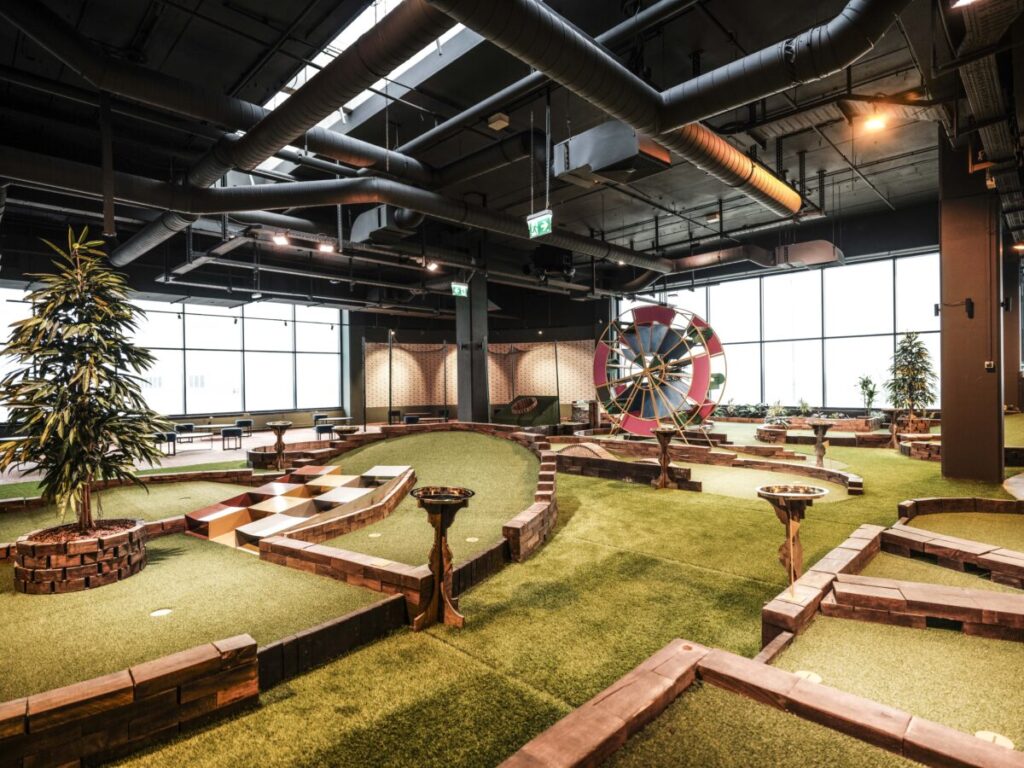
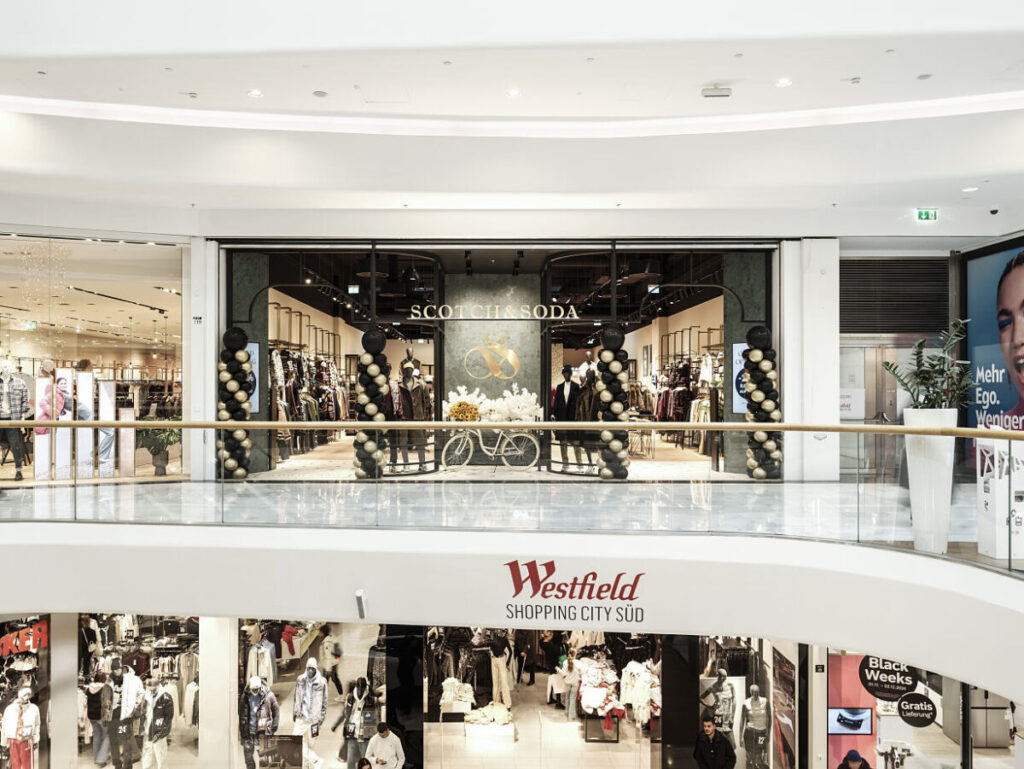
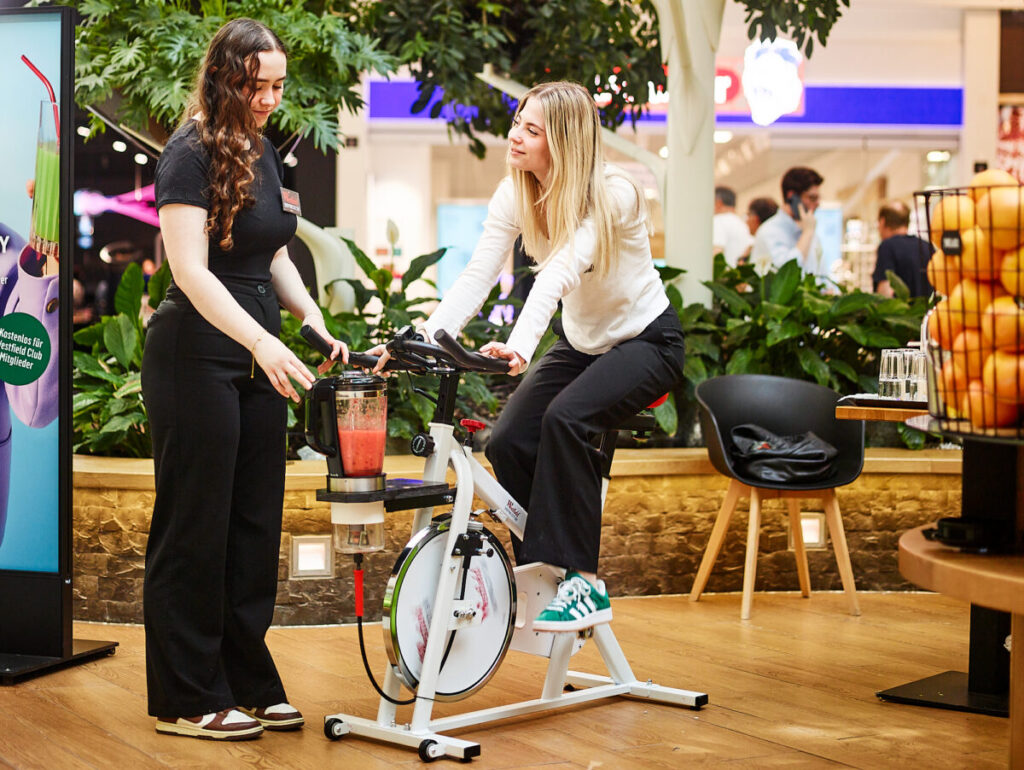
ACROSS: To what extent has the focus on entertainment and gastronomy changed the length of stay and the customer profile?
Juhasz: We clearly focus on families from the direct catchment area of Lower Austria and Vienna. We want to be a destination where people can spend the whole day, with every family member finding something that suits his or her needs. Our efforts to enhance the experience beyond traditional shopping have been particularly well received, especially by women, who make up the majority of our visitors and often come with their friends or children. At the same time, we have a strong base of loyal older customers, which is why we aim to create a well-rounded experience that caters to all generations.
Beyond that, we have also noticed a significant increase in shopping tourism. Visitors from Burgenland, across Austria, Hungary, and even Germany are choosing our center as a destination. In an effort to further support that trend, we actively promote group travel offers for bus tours and provide a dedicated shuttle service from Vienna’s city center, making it even easier for tourists to visit.
ACROSS: Are there any plans for a hotel in this context?
Juhasz: The possibility of a hotel is currently under discussion and is being thoroughly evaluated. Such an addition would further enhance the location and strengthen its appeal to tourists. There is both potential and available space for such development.
ACROSS: What other areas need to be expanded in the future?
Juhasz: Another important area of focus for the future is the expansion of our range of services, and we are intensively working on that – especially in the field of medical care. Our sister center, the Donau Zentrum, serves as a great example, offering a wide variety of doctors, a registry office for weddings, and even funeral services. Shopping centers have the potential to be more than just retail destinations; they can evolve into key hubs that support different aspects of people’s daily lives, making them even more relevant and convenient for visitors.
ACROSS: Let’s take a look at the traditional retail tenants. Once again, a lot has happened lately.
Juhasz: SCS continues to be the go-to location for international retailers entering the Austrian market. In 2024 alone, we welcomed a variety of exciting new brands, strengthening our position as a top-tier shopping destination. A standout moment was the launch of Austria’s first and only monobrand adidas store, which opened in October, alongside the debut of Austria’s first New Balance monobrand store. The premium fashion segment at SCS also continues to grow, with Scotch & Soda and Joop! among the latest additions, and we are thrilled to soon welcome a Ralph Lauren store. Beyond fashion, we have also enriched our home & interior offerings with Le Creuset and Karaca. With each new opening, we reinforce our vision of creating a shopping destination that combines global brands, premium retail, and innovative concepts. Our goal is to continuously elevate the shopping experience and solidify SCS as a benchmark for the Austrian retail landscape.
ACROSS: What changes have you generally seen on the retailer side?
Juhasz: A clear trend towards polarization is shaping the retail sector, and that is reflected at our center as well. To provide the best possible experience for our visitors, we have structured SCS into distinct clusters for different segments. Concepts like Primark continue to attract a strong customer base, with visitors traveling from far and wide – a dynamic that also benefits the surrounding stores.
When looking at the broader retail landscape, we see that brand positioning and marketing are becoming increasingly important, particularly in the premium segment. Differentiation and compelling storytelling are key factors when it comes to standing out, and some industries – especially those focused on sustainability – are excelling in that regard. At SCS, we actively support our brand partners by creating an environment in which they can thrive, while also ensuring that the center as a whole remains an attractive and dynamic destination.
ACROSS: What makes the composition of the tenant mix at SCS special?
Juhasz: The tenant mix at SCS is carefully curated to offer visitors a diverse and high-quality shopping experience. However, what truly sets SCS apart is the consistent quality and aesthetic appeal of its retail spaces. A key aspect of this is shopfitting. Every brand – regardless of its size or global recognition – adheres to our shopfitting guidelines, which are integral parts of the lease agreement. These guidelines ensure that each store aligns with the overall design vision of the center, creating a visually harmonious and inviting atmosphere. To maintain this high standard, we have an in-house concept studio that defines specific interior design principles. We work closely with our tenants throughout the planning process, helping them bring their store concepts to life in a way that fits both their brand identity and the aesthetic of SCS. Ultimately, every store design must receive final approval from our designers to ensure a cohesive and premium shopping environment for our visitors.
ACROSS: Are there any limits with respect to the tenant mix?
Juhasz: Rather than limits, we see constant evolution in the tenant mix, with boundaries shifting and expanding in exciting ways. Retail is transforming, and shopping centers must adapt by embracing new concepts and services. This dynamic development keeps our industry fresh and allows us to offer visitors an even more diverse and engaging experience.
A great example can be found in the BYD store, the first of its kind in Austria. Bringing an e-car showroom to a shopping center was an unconventional idea that required innovative thinking and close collaboration with the authorities to find the right regulatory framework. It’s exactly these kinds of forward-thinking projects that drive us – pushing the traditional boundaries of what a shopping center can be and creating spaces that go beyond shopping.
ACROSS: Finally, what is the top priority when it comes to managing a successful location?
Juhasz: The key to success is ensuring that people actively choose to visit the center. A shopping center thrives when customers come – not just once, but regularly. That’s why we focus on reaching them where their journeys begin, whether it’s at home through digital engagement or through seamless navigation to and within our center. At SCS, we follow a double-loop approach, optimizing both the external and internal customer journeys. That means making every step seamless, whether it’s ensuring that individual entrances and key locations are accurately mapped online or creating a welcoming and intuitive environment once visitors step inside. Another example came from the Donau Zentrum, where we reassessed various aspects of the customer experience following the energy crisis. A simple measure like adjusting ambient music in certain areas initially seemed practical, but we recognized that a sense of comfort and security was just as vital as efficiency. These subtle details significantly contribute to the overall well-being of our visitors and influence their decision to return. Our 4-star concept ensures that every detail is designed to enhance the visitor experience, making SCS not just a place to shop, but a destination where people feel at home, enjoy their time, and are eager to return.
Three Examples of Elementary and Forward-Looking Adjustments
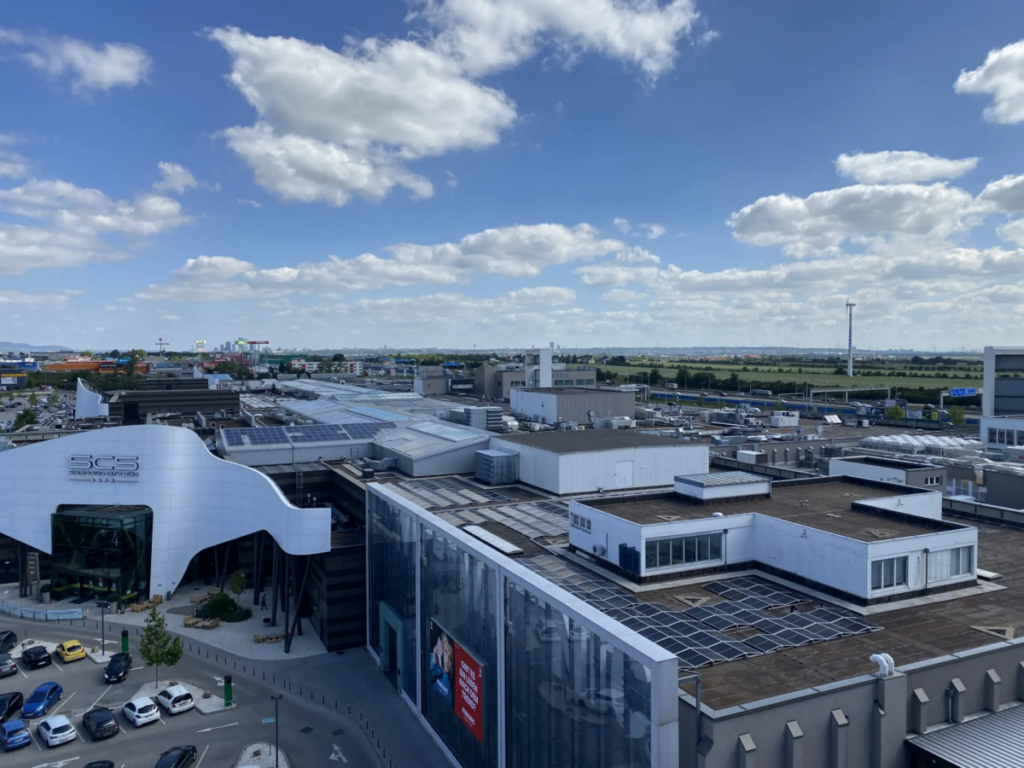
Committed Action for ESG Goals: Extensive Installation of Photovoltaic Systems
With the recently completed PV roofing of parking spaces, Westfield Shopping City and the state of Lower Austria have executed an innovative project. The topic of sustainability has been a central component of the URW “Better Places” corporate strategy for many years. The new photovoltaic site on parking deck 8, equipped with more than 1,300 PV panels and a capacity of almost 500 kWp (kilowatt peak), complements the large-scale system that was installed on the main roof in 2021, which is still the largest system on the roof of a shopping center in Europe. Both projects send a visible signal of SCS’s commitment to renewable energy. The system on the parking deck alone is expected to produce around 450,000 kilowatt hours (kWh) per year, making a significant contribution to reducing the carbon footprint. In terms of net zero emissions, Unibail-Rodamco-Westfield has set itself ambitious targets and plans to reduce CO2 emissions along the entire value chain by 50 percent by 2030 and by 90 percent by 2050.
State-of-the-Art Conversion of the Entertainment Area
With the “DSTRCT Entertainment Center”, a new state-of-the-art leisure and entertainment area opened at the Westfield SCS multiplex at the end of 2024. The new, 2-level concept, which SCS has implemented with the internationally experienced Austrian company Elite Experience EC GmbH, is a further milestone in the repositioning and modernization that began with the new Cineplexx cinema in December of the previous year and pays tribute to the “social gaming” megatrend.
The offer includes:
- 5 “NoWayOut” escape rooms
- 12 “StrikeCity” bowling lanes
- 3 stylish bars and a restaurant
- Interactive highlights such as steel darts, shuffleboard, and private party rooms with a karaoke option
- 3 “Balls&Clubs” adventure mini-golf courses from
- Over 100 arcade games from classic pinball machines to modern slot machines
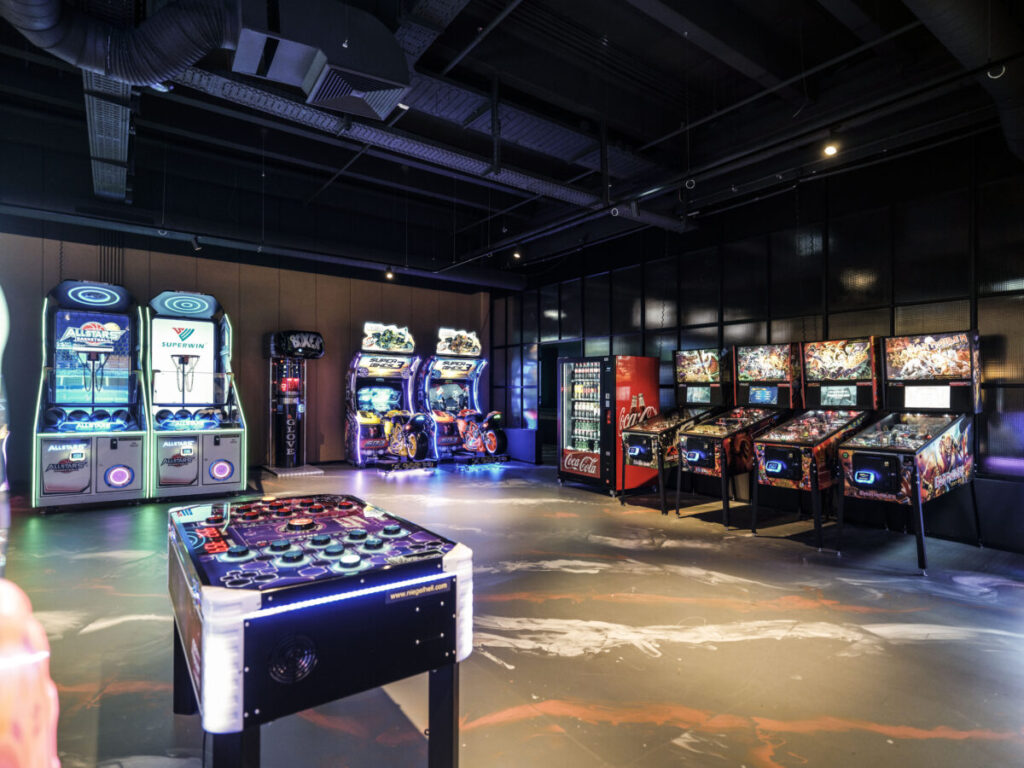
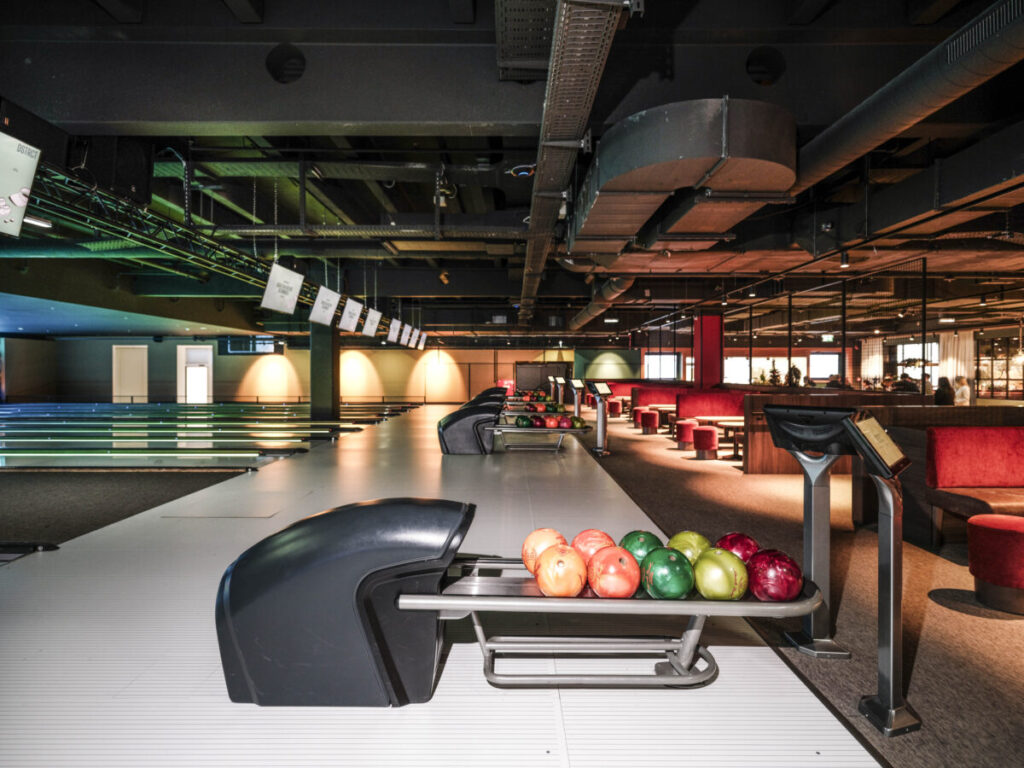
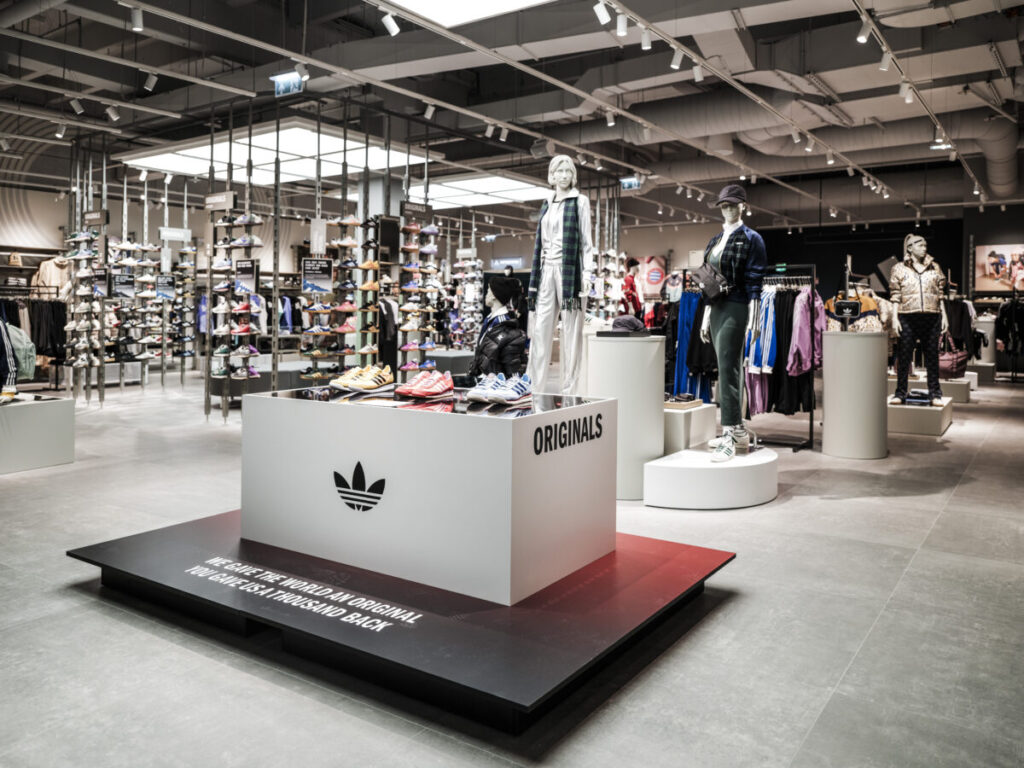
Outstanding Brand Expertise of the Center
The established brand mix, the constant opening of many excellent brands, and SCS’s decision on brand market entries, in particular, demonstrates the strong market position of Westfield Shopping City Süd and its appeal, which stretches beyond national borders. National and international brands see the center as the ideal location to enter the Austrian market, expand with flagship stores, or launch completely new retail concepts. In 2024, in particular, the already impressive lineup of tenant brands was expanded by several brand debuts in Austria, including the country’s first adidas monobrand store, which, alongside New Balance, enhances the activewear offering as new partners. In premium fashion, Joop!, Scotch & Soda, Rinascimento, and Brax add variety and distinction. Furthermore, the center has also expanded its brand mix with the addition of Le Creuset, DJI, Karaca, and Modern Asia Market. In terms of dining and culinary delights, the internationally renowned burger restaurant Five Guys and the French PAUL Bakery will open in 2025. Cinnamood recently opened its doors as well.
all images: WESTFIELD SHOPPING CITY SÜD
